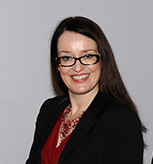CCTV is highly beneficial – if you want it to be, writes Pauline Norstrom, pictured, chief operating officer of the surveillance monitoring solutions company AD Group which includes Dedicated Micros and AD Network Video. Pauline Norstrom is also chair of the British Security Industry Association (BSIA) trade body.
Sunday’s radio interview with Tony Porter, Surveillance Camera Commissioner, on BBC Five Live created quite a stir. Tony’s comments have been picked up by many national newspapers, such as The Daily Telegraph and Daily Mail, which have written up feature pieces. Many paint an unfavourable picture of the the role of CCTV within our society.
Tony is a good friend of the industry and the British Security Industry Association. I have shared speaking engagements with Tony and know his views are insightful, based on a reflective, proactive and honest approach to ensuring businesses and the public alike benefit from CCTV.
If I might say I share this approach. I want to ensure society and commerce benefit from CCTV. I also agree with many of the comments that Tony is quoted as saying.
Yes, as Tony is quoted, “run well, its a useful tool for society.” Evidential quality is essential for the courts. Councils are wasting money on systems that do provide the material required.
Yet, somehow the reporting has presented an industry state of affairs that I and the BSIA do not recognise as being properly balanced.
I must say before I continue that I have not heard the interview. It is at the time of writing unavailable online on the BBC website. Moreover, my information comes from the national media stories and these are a secondary source. This secondary reporting is a concern as I shall show below.
If we delve a little deeper we understand better the current issues within the surveillance security industry.
One illustration in the coverage is a recent report in the media about CCTV not deterring crime in town centres.
It is a concern. Yet, there are credible reasons for this unsatisfactory state of affairs. We know of many councils and local authorities that have not updated their systems for many years and so the quality of the video is no longer fit for purpose. Those engaging in criminal activity do not believe the video is of sufficient quality to secure a prosecution and so engaging in criminal activity is not impacted by CCTV.
We can also add that systems are often not maintained regularly and that many experienced and skilled CCTV operators have unfortunately lost their jobs as budgets have come under increasing pressure. So it is not a surprise if CCTV employed in this respect is not delivering the return-on-investment we as suppliers expect to give clients.
So I agree with Tony that CCTV has to deliver a return, but the very important caveat above was not mentioned by the newspapers.
The Daily Mail, for instance, came up with this:
“Problems include organisations using different CCTV equipment and networks. It means that, for instance, a shoplifter being tracked by council CCTV in a public street is lost when they flee into a shopping centre where the system is privately owned.”
So after the Mail quotes in its article a list of councils with CCTV systems that don’t work, it states that council surveillance would be able to track criminal activity effectively. It then goes on to intimate private CCTV operators cannot or will not work together.
We know of many high profile criminal cases that would not have been solved if not for the co-operation of CCTV operators and the wide areas their cameras cover.
The horrific murder of Mohammed Saleem in 2013 by a Ukrainian national in Birmingham is just one example. The murderer was almost untraceable as he was in the UK for only a few weeks, which made it harder to identify the suspect or get any leads from any associations he might have made.
CCTV was used from multiple sources, private and public, to track his movement from the scene of another of his crimes and with painstaking Police work he was tracked down. Without CCTV Pavlo Lapshyn would have been free to commit more crimes. He certainly would not have been caught as early as he was.
Clearly I am concerned that the secondary reporting is, in some cases perhaps innocently, misleading.
Many points raised by the interview and the following reportage are vital to the industry.
I am pleased that there has been renewed attention for the CCTV surveillance industry. We listen to our clients needs and we should and do listen to all the stakeholders involved in the industry, from business and public sector operators to the public and law enforcement agencies.
The sterling work of the BSIA to build understanding between a diverse range of stakeholders through its initiatives, all with genuine interest and concerns will continue.
I just ask that we discuss the issues in depth, with an open mind and with balance. We all want safer streets and properties and we must work towards that aim. I believe that surveillance monitoring is an essential element to meeting that objective.
Links
http://www.bsia.co.uk/.









